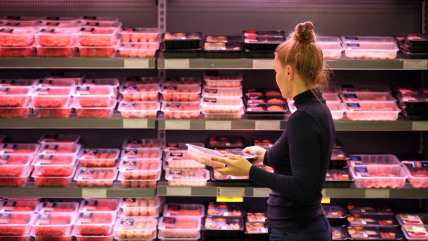
Branded consumer foods in the US continue to lose volume ground to private label as price gaps with retailers’ own-label ranges widen.
US investment bank AllianceBernstein analysed market data to conclude that “private label has consistently gained volume market share since early 2022, contributing to the volume weakness seen in branded volumes”.

Discover B2B Marketing That Performs
Combine business intelligence and editorial excellence to reach engaged professionals across 36 leading media platforms.
The market share for own-label was up 33 basis points in the past 12 weeks at 26.9% in measured US channels, AllianceBernstein analysts led by Alexia Howard, wrote in a report.
They added that the gain “contrasts a steady dollar market-share dynamic we’ve seen over this period, as branded companies took greater pricing than private label, translating into expanding price gaps”.
In terms of price differences, the gap for branded foods over private label has “steadily” widened since 2021 to reach 38.8% so far this year, up from 38.4% in 2023 and 36.8% in the prior 12 months.
The data emphasises concerns of US food manufacturers striving to recover volumes lost during the inflation-linked pricing cycle, which has not entirely disappeared. Financial results issued over the past week showed varying volume pressures as pricing continues to be taken, albeit to a lesser degree in most cases.

US Tariffs are shifting - will you react or anticipate?
Don’t let policy changes catch you off guard. Stay proactive with real-time data and expert analysis.
By GlobalDataKellanova noted “volume pressures” as the snacks and frozen food maker reported its second-quarter results, while Hershey CEO Michele Buck said “consumers are pulling back from discretionary spending” in confectionery.
Kraft Heinz, meanwhile, cut its sales forecast amid “waning consumer sentiment” as shoppers seek out “value”.
Mondelez International was more sanguine, despite a third straight quarterly decline in volumes. The snacks and confectionery supplier said: “Private-label growth in our categories is decelerating, while branded share growth is improving.”
AllianceBernstein echoed that sentiment, noting that while own-label volume share rose in the past 12 weeks, “volume share gains decelerated sequentially, a positive trend for branded volumes entering the second half of 2024”.
Drumming down into the companies the investment bank covers, the analysts said Tyson Foods, McCormick and Kraft Heinz “are the most at risk of a consumer trade down to private label”.
However, in McCormick’s case, the bank said the spices and seasonings brand owner is also a “large producer of private label”, and so “not all sales are lost in a shift from branded to private label”.
In AllianceBernstein’s coverage, Beyond Meat, Hershey, and Simply Good Foods are “the least exposed with de minimis exposure” to own-label, the bank said.
In the opposite scenario to branded food companies outside of the bank’s coverage, it said the price gaps with private label for its in-house firms has narrowed.
Excluding McCormick, AllianceBernstein said the market data shows the price gap has shrunk to 48.1% so far this year, down 70 basis points from 2023, and compared to 52.3% in 2020.
“This suggests that pricing for our coverage companies has become more competitive since 2022, as price gaps to both private label and other branded products have compressed, a positive for market share trends,” the analysts wrote.
“We wonder if some of this is due to the share losses for more expensive ‘challenger brands’ (clean label, premium brands that are new and faster growing in certain categories) at the start of the pandemic and subsequent recovery in recent years.”
Nevertheless, the investment bank’s coverage companies have still lost volume market share to own-label.
“Compared to 2022, McCormick lost the greatest volume market share to private label (220bps), followed by General Mills (190bps) and Kraft Heinz (140bps),” the analysts suggested.
“More recently, McCormick’s branded volumes are rebounding nicely, suggesting that private label is stealing share from smaller branded players.”
They added that the companies that lost the least were Hershey (10bps), JM Smucker (70bps) and Mondelez (80bps).



